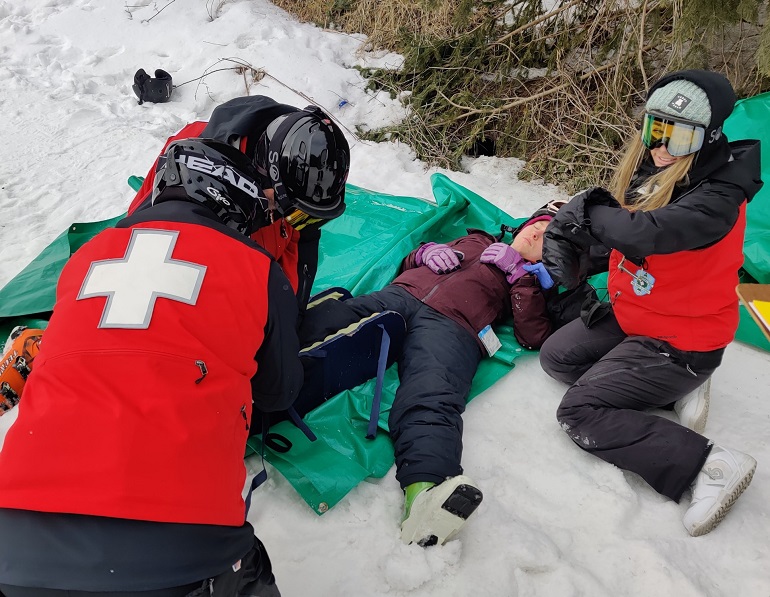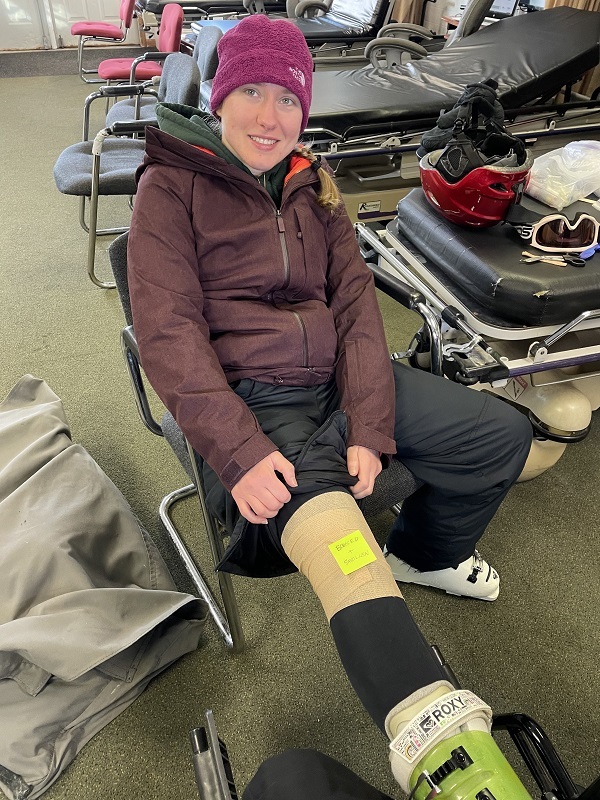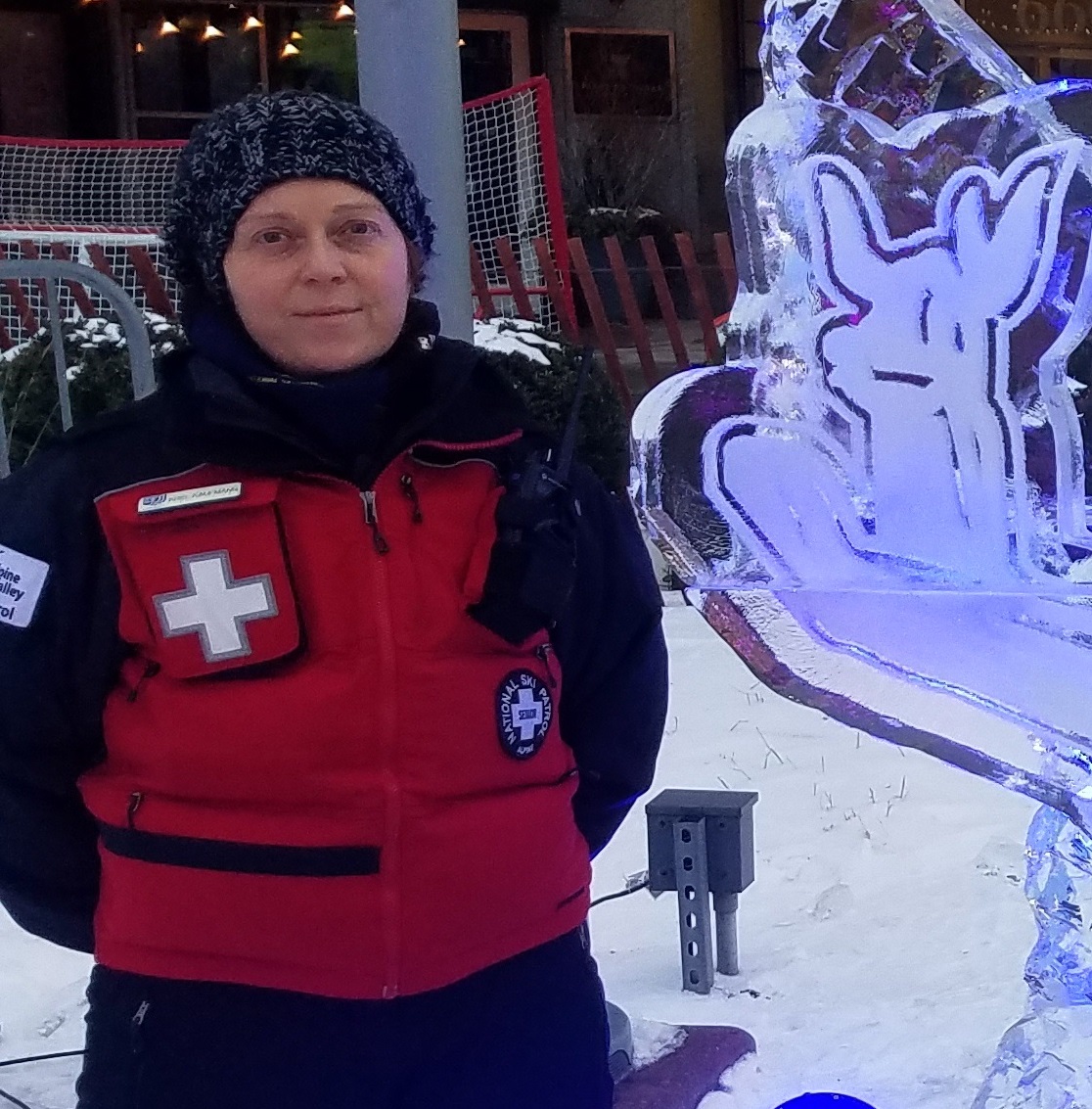
Medical emergencies can happen anywhere, including on top of a snowy ski hill. Students at the Wayne State University School of Medicine have the opportunity to train for Outdoor Emergency Care while still in medical school through a course led by National Ski Patrol Eastern Michigan Region Medical Advisor and Associate Professor of Emergency Medicine Kristiana Kaufmann, M.D., M.P.H.
The course runs from April through August, meeting two nights a week for three hours at Alpine Valley Ski Resort in White Lake, Mich.
Fourth-year medical students Beth Moore and Evan Zeddies have completed the Outdoor Emergency Care course and toboggan testing to become active patrollers.
For Moore, the opportunity to volunteer brought her into her favorite element – snow. She patrols for eight-hour shifts every Sunday at Alpine Valley, and plans to continue after graduation.
“I love being outside and I love the snow. I was missing an activity that kept me active outside during the winter months that was also 100% just for me, not my medical education. It also taught me about the handoff of care between people who stabilize in the field, to Emergency Medical Services, and to physicians,” she said. “Additionally, it served to make me confident in my first aid skills, which is sorely lacking in undergraduate medical education in this country. It allowed me to join a like-minded community of really amazing people.”

Second-year student Abigail Kuplicki attended her first Ski Patrol training at Pine Knob Ski and Snowboard Resort in Independence Township, Mich., last month. She volunteered to learn more about wilderness medicine, emergency medicine and rural medicine.
“Volunteering with Ski Patrol was a fun experience where I got to learn about an entirely different type of patient care. I met people in various stages of their career, both in health care professions outside of Ski Patrol, and not,” Kuplicki said. “For those interested in wilderness medicine, this was also a good way to learn about different opportunities, even beyond Ski Patrol.”
To attain the status of active patroller, patrollers must pass the Outdoor Emergency Care course, equivalent to a Medical First Responder level, and just below training given to an Emergency Medical Technician, Dr. Kaufmann said.
The training includes spine motion restriction, stop-the-bleed, traction splints for femur fractures, Basic Cardiac Life support, and the care of many traumatic injuries and medical ailments.
“We do quite a bit of splinting of wrist fractures, clavicle fractures and knee injuries,” Dr. Kaufmann said.

The second half of training includes ski or snowboard enhancement and learning how to bring a toboggan loaded with a patient safely down the ski hill, which Zeddies managed in three months in his third year of school, squeezing in one or two evenings on the hill per week while also finishing his Psychiatry, Neurology and Internal Medicine rotations.
“This takes quite a bit of training and practice, usually every Sunday morning from 9 a.m. to 1 p.m. for one or two seasons depending on your skill level. We also train patrollers to safely remove guests from a chairlift if the chairlift breaks down. This involves an eight-foot slingshot, a special evacuation chair and a belay system,” Dr. Kaufmann said.
Like his classmate, Zeddies will continue the work after graduation if he lives near a resort staffed by the National Ski Patrol.
The National Ski Patrol is the largest first aid educational program in the country, with 600 patrols and 26,000 ski patrollers, most of them volunteers.
“During medical school I discovered that I really enjoyed learning and teaching first aid skills, ultimately becoming a First Aid First and WSU Wilderness Medicine board member. Dr. Kaufmann is the founder and faculty board member for First Aid First, and she adapted a lot that curriculum from the National Ski Patrol’s Outdoor Emergency Care course,” Zeddies said. “Given my longtime love of snowboarding and experience teaching the FAF course on a near-monthly basis, joining the National Ski Patrol felt like an exciting and natural next step. All that said, the mandatory training required to become a certified patroller is a lot of work. I learned a ton of new skills that have been applicable in the hospital, as well as gaining experience and familiarity with community EMS protocols.”
Dr. Kaufmann has been a ski patroller at Alpine Valley Ski Area in White Lake, Mich., since her third year of medical school, although she began going to the Ski Patrol Hut with her mother, who has been with the National Ski Patrol since the 1970s.
Dr. Kaufmann’s patrol sees about 350 injuries a year at Alpine Valley, with many transferring to Huron Valley Sinai Hospital, where she is an Emergency Medicine physician.
“This helps our patrol get quality improvement feedback on the guests they take care of,” she said.
Dr. Kaufmann is also medical advisor and senior Outdoor Emergency Care instructor for Alpine Valley. The National Ski Patrol offers more advanced training, including Senior Alpine Patroller and Certified Patroller, which includes avalanche courses, mountaineering courses and more.
“Once you are a patroller, you will need to patrol 10 hours a week during the ski season and attend one OEC refresher, work party and chair evac refresher yearly,” she said. “As an instructor, I also spend my summers teaching the OEC course, and some patrollers are very active on Bike Patrols in the area,” she said. “Once you are a patroller, you can be on patrol anywhere in the country that has a volunteer patrol, and after a medical degree, may also be a paid patroller at certain resorts. Each patrol has slightly different requirements and perks, but most patrollers receive a free season pass for themselves and their families, or free passes for friends.”
For more information on becoming a Ski Patrol volunteer, visit https://alpinevalleyskipatrol.org/